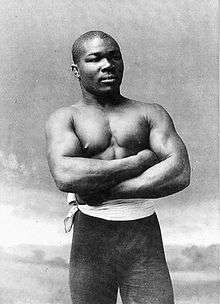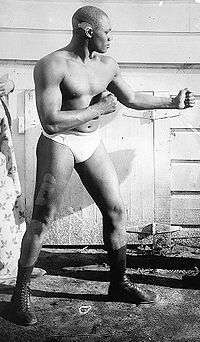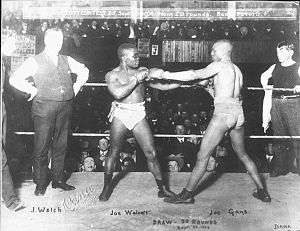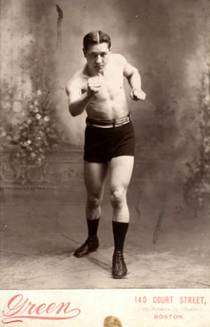Barbados Joe Walcott
Joe Walcott (March 13, 1873 – October 1, 1935), also known as Barbados Joe Walcott to distinguish him from the more contemporary American boxer known by the same name, was a Bajan born professional boxer who reigned as the World Welterweight Champion from 1901-1906, becoming the first black ever to capture the title. He was elected to The Ring Boxing Hall of Fame in 1955 and the International Boxing Hall of Fame in 1991.
| Joe Walcott | |
|---|---|
 | |
| Statistics | |
| Real name | Joe Walcott |
| Nickname(s) | Barbados Demon Black Demon |
| Weight(s) | Welterweight |
| Height | 1.56 m (5 ft 1 in) |
| Reach | 65 in (165 cm) |
| Nationality | |
| Born | March 13, 1873 Demerara, British Guyana |
| Died | October 4, 1935 (aged 62) Massillon, Ohio |
| Stance | Orthodox |
| Boxing record | |
| Total fights | 166 |
| Wins | 104 |
| Wins by KO | 61 |
| Losses | 32 |
| Draws | 27 |
| No contests | 3 |
Walcott was a formidable fighter with exceptional power to his punch. His manager was Tom O'Rourke. In evidence, his wins were an impressive 60% by knockout.
"Barbados" Joe Walcott was the idol of the more contemporary boxer "Jersey" Joe Walcott, who took his idol's real name as his own ring name.[1]
Early life and career
Walcott was born on March 13, 1873, in Demerara, Guyana, according to several sources, though he spent most of his youth in Barbados. As a youngster he set out to see the world and got a job as a cabin boy on a ship sailing to Boston that arrived around 1887.[2] He soon settled in Boston as a piano mover, and porter and took other odd jobs as well. Later, he landed a job in a gym, and became popular with even the best of the boxers as an able opponent before turning professional. His amateur boxing and wrestling years spanned roughly from 1887-89.[3][2]
Professional career
His early professional boxing years between 1890 and 1896 focused in the areas of Boston and New York city. One of his more noteworthy bouts included a 15-round draw with Mysterious Billy Smith, and a fifteen-round loss to George "Kid Lavigne" in March and December 1895. He lost to Welsh born middleweight Tommy West in 1894 and 1897. West acted as a sparring partner for Walcott in late October 1904.[2]
First attempts at the world lightweight and welterweight championships
Walcott first challenged for the Lightweight Championship on October 29, 1897, at the Lennox Athletic Club in New York, but was TKO'ed by the champion George "Kid" Lavigne in the 12th round. He was also unsuccessful in his first attempt to win the world Welterweight championship when Mysterious Billy Smith outpointed him on December 6, 1898. Likely his most frequent opponent, Walcott fought Smith six times in his career.[1]
On February 23, 1900, Walcott met the Jewish light heavyweight, Joe Choynski, winning in a surprising seventh-round TKO, though outweighed by 16 pounds and conceding his opponent a full foot advantage in height. Likely sensing the need for a quick start against his gifted opponent, Walcott sent Choynski to the mat five times in the first round and was the aggressor throughout the bout.[1] Choynski, a 3-1 betting favorite before the bout, suddenly became a 2-1 underdog after the sound of the first round bell.[4] Walcott seemed to have a slight advantage in the second, though Choynski landed a solid blow. By the third round, Walcott pressed his advantage with a superior defense, and landed blows nearly at will before the sound of the bell. The fourth seemed even, with the fifth entirely in Walcott's favor, while in the sixth Walcott cut Choynski's right eye. Walcott sent Choynski to the floor again in the seventh, battering his clearly exhausted opponent. Stopping the final round 38 seconds in, the referee said later that he "felt another blow to Choynski would have put him out."[5]
On September 27, 1901, Walcott impressively defeated Irish boxer George Gardner in a twenty-round points decision at the Mechanic's Pavilion in San Francisco, California. The pre-fight betting was light before the match with Gardner a 10-8 favorite.[6] Gardner, at just under six feet, and holding a serious reach advantage over Walcott, would briefly hold the light heavyweight championship of the world from July through November 1903. Walcott was the aggressor throughout the bout, landing more clean blows, though there was a great deal of clinching and wrestling throughout the furious bout, likely a result of the mismatch in reach between the two opponents. In the first round, Walcott brought Gardner to his knees from a left and right to the head for a nine count, though Gardner returned to the fighting unfazed.[7]
Taking the world welterweight championship from Rube Ferns, 1901
Walcott won the world welterweight title on December 18, 1901 in Buffalo, New York, from reigning champion James "Rube" Ferns achieving a technical knockout in the fifth round. Ferns, from the reaction of the Buffalo crowd as he entered the ring, appeared to be the favorite. Walcott sent Ferns to the floor twice in the fifth round, the first a solid blow to the jaw. Rube took the count both times. At the end, the referee stopped the bout to prevent a knockout. Ferns began to weaken as early as the third round, and in the fourth Walcott sent Ferns through the ropes.[1][8] The bout featured a clinch in the fourth round that brought both boxers to the mat, possibly a result of a tiring Walcott attempting to counter Fern's six inch height advantage and superior reach. The match brought roughly 2,000 spectators to the club house, and tickets ranged from a respectable $2 to $5.[9]
On June 18, 1903, Walcott fought Young Peter Jackson, an exceptional black contender to a twenty-round draw, in Portland, Oregon, in a match billed as a world welterweight championship. The title did not change hands due to the draw decision.[1] Walcott would later lose to Jackson on June 10, 1904, in a fourth-round knockout during a non-title fight in Baltimore, after receiving a punch to the stomach. Up until the time of the knockout, Walcott was considered to have a slight lead over Jackson, as his blows to the head and neck of his opponent were not landing with much force.[10] Walcott had previously fought Jackson twice in the winter of 1902 to a win and a draw.[1]
Controversy vs. Dixie Kid in title match, 1904
On April 4, 1904 Walcott defended his title against black contender Dixie Kid. He was winning the fight handily when the referee disqualified Walcott for no apparent reason in the final seconds of the 20th round. "Duck Sullivan", the referee, was a last minute replacement, and Walcott protested the choice before the bout began. In the one sided contest, Walcott appeared to have a clear advantage in all but the seventh round. Many in the crowd were shocked with the decision, and Walcott himself was immediately angered at referee Sullivan who made the call.[11] The match was disregarded as a title bout when it was discovered, not surprisingly, that referee Sullivan had bet on Dixie Kid to win the match.[1]
Mid-career, and loss of the world welterweight championship to Honey Mellody, 1906
Historic draw with Sam Langford, 1904

Walcott fought the exceptional black boxer Sam Langford in a non-title fight before a modest crowd of 1,200 in Manchester, New Hampshire on September 5, 1904, with the fight ending in a fifteen-round draw.
Langford had the better of the bout for the first seven rounds and staged an excellent defense, but in the remaining eight rounds, Walcott fought furiously in a close battle where the crowd could not anticipate the outcome til the referee's decision.[12] In the third round, Langford brought Walcott to one knee with a blow to the jaw.[13]
Historic draw with lightweight champion Joe Gans, 1904

Walcott met world lightweight champion Joe Gans in a non-title fight at Woodward's Pavilion in San Francisco on September 30, 1904, and scored a draw after 20 thrilling rounds. Many in the crowd believed Gans should have received the decision. The lightweight champion gained a lead from the second till the tenth using his right almost exclusively on the body of Walcott. Walcott, however, put tremendous force behind his blows, weakening the lightweight Gans in several points in the bout.
After the tenth, Gans became the superior boxer, avoiding the blows of Walcott, and connecting with solid rights and lefts to the face. In the nineteenth round, Gans landed a solid blow to Walcott's jaw that might have ended the fight. In the final round, Gans showed dominance in the in-fighting, though neither fighter took a clear lead. An examination after the fight showed that Walcott had broken the elbow of his right arm in the fourth round, though he fought on valiantly.[14]
After the Gans fight, on October 18, 1904, Walcott accidentally shot himself in the hand, losing several fingers. Walcott took a year off of boxing to recover from the injury, but it may have effectively limited his remaining years as a world class prizefighter. Walcott, however, continued to box until 1911.[1][3]
Loss of the world welterweight title to Honey Mellody, 1906

Before a crowd of 3,000, Walcott officially lost the world welterweight championship on October 16, 1906 against William "Honey" Mellody at the Lincoln Athletic Club in Chelsea, Massachusetts. Falling to a twelfth-round technical knockout, Walcott quit the bout, claiming his left arm had been injured in the ninth round.[1] In the first round Walcott scored a knockdown. Melody, fighting cautiously against the reigning champion, landed mostly body blows throughout the remainder of the fight, but scored enough to appear to dominate.[15] In the sixth round, Mellody landed a strong right to the jaw which backed Walcott against the ropes. In the eleventh, Mellody put in punches at will, and in the final round landed a flurry of rights to the stomach, before Walcott retreated to his corner before the bell ending the bout.[16]
Returning to the ring on January 15, 1907, Walcott lost a fifteen-round decision on points to Mike Donavan in Providence, Rhode Island. Though winning only a few of his remaining bouts, Walcott succeeded in twice beating George Cole, a competent hard hitting middleweight from Philadelphia, in December 1907 and January 1908. In fact, of their December meeting in Philadelphia, one source noted that "with the exception of the third round when Cole sent over some very hard punches," the "battle was Walcott's all the way."[17]
On January 7, 1908, Walcott lost to a noteworthy opponent Jimmy Gardner, in twelve rounds at the Armory in Boston. Gardner would become a world welterweight contender against Mike "Twin" Sullivan in April of that year. New York's Evening World, wrote that Walcott's performance "did not come up to expectations", and that Gardner's win "was one of the easiest victories he ever earned."[1][18] On November 2, 1911, Walcott fought his last reported bout against Tom Sawyer in Lowell, Massachusetts. He walked out of the ring before the bell at the end of the one-sided 12-round technical knockout, and said to the crowd "I'm 40 years old and I guess I'm done with this game."[1]
Later life
Walcott squandered a fortune earned in the ring and eventually found employment as a custodian at the old Madison Square Garden. He died at 62 on October 4, 1935.[1] He was reported missing in December 1935, by his daughter. He had been last seen around Mansfield, Ohio, on a trip he was taking to find work in Hollywood. It was later reported he died in a car accident in Massillon, Ohio, fifty miles from Mansfield.[19][20]
It was believed that Joe was walking along Route 30 in the Village of Dalton, Ohio (8 miles west of Massillon) and was struck and killed by a car. His body was not claimed and the Village of Dalton buried him at the edge of the cemetery. There is a small grave marker there to this day that reads Ex World Champion, Joe Walcott 1827-1935.
Boxing honors and achievements
| Achievements | ||
|---|---|---|
| Preceded by Rube Ferns |
World Welterweight Champion December 18, 1901 – October 16, 1906 |
Succeeded by William "Honey" Mellody |
Nat Fleischer rated Walcott as the greatest welterweight of all time and in 2003 he was included in the Ring Magazine's list of 100 greatest punchers of all time. He was elected to The Ring Boxing Hall of Fame in 1955 and the International Boxing Hall of Fame in 1991. [21]
Notable bouts
| Result | Opponent | Type | Rd., Time | Date | Location | Notes[22] |
| Loss | PTS | 20 | 1906-10-16 | Lost World Welterweight Title | ||
| Draw | PTS | 20 | 1904-09-30 | |||
| Draw | PTS | 15 | 1904-09-05 | |||
| Loss | KO | 4 (10) | 1904-06-10 | |||
| Loss | DQ | 20 | 1904-04-29 | Retained World Welterweight Title | ||
| Draw | PTS | (20) | 1903-06-18 | Retained World Welterweight Title | ||
| Win | TKO | 4 (20) | 1903-05-28 | |||
| Draw | PTS | 10 | 1903-04-20 | |||
| Loss | PTS | 20 | 1902-04-25 | |||
| Loss | NWS | 6 | 1902-04-11 | Newspaper Decision | ||
| Draw | PTS | 10 | 1902-03-13 | |||
| Win | NWS | 6 | 1902-01-13 | Newspaper Decision | ||
| Win | TKO | 5 (20), 2:50 | 1901-12-18 | Won World Welterweight Title | ||
| Win | PTS | 20 | 1901-11-28 | |||
| Win | PTS | 20 | 1901-09-27 | |||
| Win | DQ | 10 (20) | 1900-09-24 | |||
| Win | PTS | 25 | 1900-05-04 | |||
| Win | TKO | 7 (25) | 1900-02-23 | |||
| Loss | PTS | 20 | 1898-12-06 | For World Welterweight Title | ||
| Draw | PTS | 25 | 1898-04-14 | |||
| Loss | TKO | 12 (20) | 1897-10-29 | For World Lightweight Title | ||
| Loss | PTS | 15 | 1895-12-02 | |||
| Draw | PTS | 15 | 1895-03-01 |
See also
- Lineal championship
- List of welterweight boxing champions
References
- "Joe Walcott". BoxRec. Retrieved 25 November 2016.
- "Joe Walcott". Cyber Boxing Zone. Retrieved 27 November 2017.
- "Joe Walcott Biography". BoxRec. Retrieved 25 November 2016.
- "Joe Walcott Beats Choynski", Argus-Leader, Sioux Falls, South Dakota, pg. 2, 24 February 1900
- Choynski sent to the mat five times in the first in "Walcott a Surprise", The Brooklyn Daily Eagle, Brooklyn, New York, pg. 13, 24 February 1900
- "Old Joe Walcott Wins Against Gardner", The Missoulian, Missoula, Montana, pg. 1, 28 September 1901
- "Boxer Joe Walcott Gains Decision", San Francisco Call, San Francisco, California, pg. 4, 28 September 1901
- "Rube Ferns is Beaten", Courier Journal, Louisville, Kentucky, pg. 3, 19 December 1901
- "Sporting News of the Day", The Buffalo Enquirer, Buffalo, New York, pg. 4, 19 December 1901
- "Joe Walcott Put Out", The Indianapolis News, Indianapolis, Indiana, pg. 8, 11 June 1904
- "Decision Goes to Dixie Kid", San Francisco Chronicle, San Francisco, California, pg. 8, 30 April 1984
- "Langford Outboxed Walcott", Minneapolis Journal, Minneapolis, Minnesota, pg.12, 6 September 1904
- "Walcott in Draw", The Evening World, New York, New York, pg. 11, 6 September 1904
- Walcott broke his elbow in "Fought Walcott to a Standstill", Buffalo Evening News, Buffalo, New York, pg. 8, 1 October 1904
- "Honey Mellody Gets Decision Over Walcott", The Montana Standard, Butte, Montana, pg. 8, 7 October 1906
- "Mellody Beat Walcott", Ontario Journal, Ontario, Canada, pg. 2, 30 November 1906
- "Joe Walcott Whipped Coal in a Fast Fight", The Pittsburgh Press, Pittsburgh, Pennsylvania, pg. 16, 27 December 1907
- "Joe Walcott Due For the Scrapheap", The Evening News, New York, New York, pg. 10, 8 January 1908
- "Joe Walcott Missing, His Daughter Reveals", The Bend Bulletin, Bend, Oregon, pg. 8, 14 December 1935
- Died of car accident in Massillon, Ohio, in "Joe Walcott". Cyber Boxing Zone. Retrieved 27 November 2017.
- "Joe Walcott". Cyber Boxing Zone. Retrieved 27 November 2016.
- Joe Walcott's Professional Boxing Record. BoxRec.com. Retrieved on 2014-05-18.
External links
| Wikiquote has quotations related to: Barbados Joe Walcott |